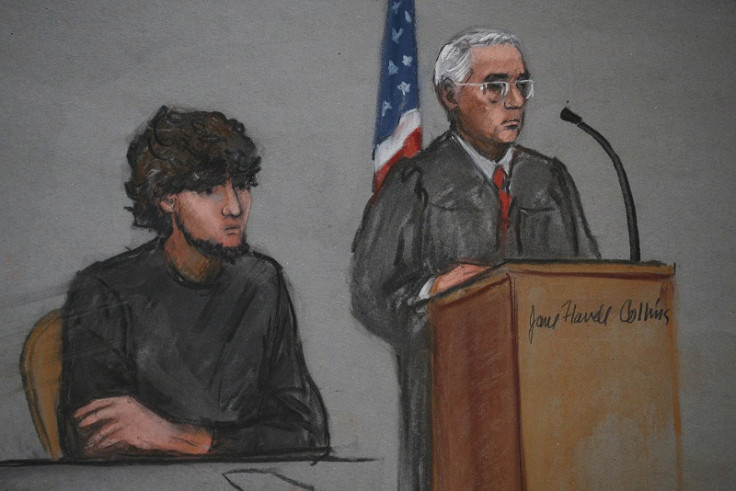Boston Marathon bombing trial: Closing arguments made, jury begins sentencing deliberations

Closing arguments in the penalty phase of the Boston Marathon were made on 13 May, as prosecutors made their last attempts to convince the federal jury to sentence Dzhokhar Tsarnaev to death. The April 2013 attack, which involved two pressure-cooker bombs, killed three and injured more than 260 people.
According to the Washington Post, prosecutors argued that the 21-year-old was a depraved terrorist who showed no remorse for his actions.
Assistant US Attorney Steve Mellin told the jury that Tsarnaev "blew apart" eight-year-old Martin Richard while seriously injuring his sister and mother. "No remorse, no apology," Mellin said, according to Voice of America. "Those are the words of a terrorist convinced he has done the right thing. He felt justified in killing, maiming and seriously injuring innocent men, women and children.
"His actions have earned him the death penalty," Mellin said. "There is no just punishment for that other than death."
The former University of Massachusetts at Dartmouth student was also convicted of killing MIT police officer Sean Collier as he and his brother, Tamerlan Tsarnaev, attempted to evade police.
During his closing arguments, Mellin stressed that Martin Richard was so young and of such short stature, that he was more exposed to the bomb's effects. "Can there be anyone more vulnerable than a little boy next to a weapon of mass destruction?" Mellin asked.
Meanwhile, the defence used its closing arguments to drive home the idea that Tsarnaev was under the command and control of older brother Tamerlan, who died in a police shootout days after the attacks.
"Jahar would have never have done this but for Tamerlan," Tsarnaev's lawyer said. "Jahar became convinced of the fallacy of the case of his brother's passion.
"I ask you to choose life," Clarke asked the jury. According to the Washington Post, Clarke said a life sentence "reflects justice and mercy" and that by sentencing Tsarnaev to life in prison they would not be dishonouring the victims of the bombing. "The law allows you to choose justice and mercy," she said.
Clarke said: "He was not the worst of the worst, and that's what the death penalty is reserved for."
In their attempt to humanise Tsarnaev, the defence used several photos of him as a young child. However, Mellin urged the jury not to be swayed by those photos, according to the Washington Post. "All murderers start out as cute children," he argued.
Deliberations begin
The jury, consisting of seven women and five men, began deliberations on Wednesday evening. The same jury found Tsarnaev guilty of all 30 charges levied against him last month, of those, 17 charges carry the death penalty.
For Tsarnaev to be sentenced to death, all 12 jurors must agree to give him the death penalty. If sentenced to life in prison, Tsarnaev will most likely spend the rest of his days in solitary confinement at ADX Florence in Florence, Colorado.
© Copyright IBTimes 2024. All rights reserved.






